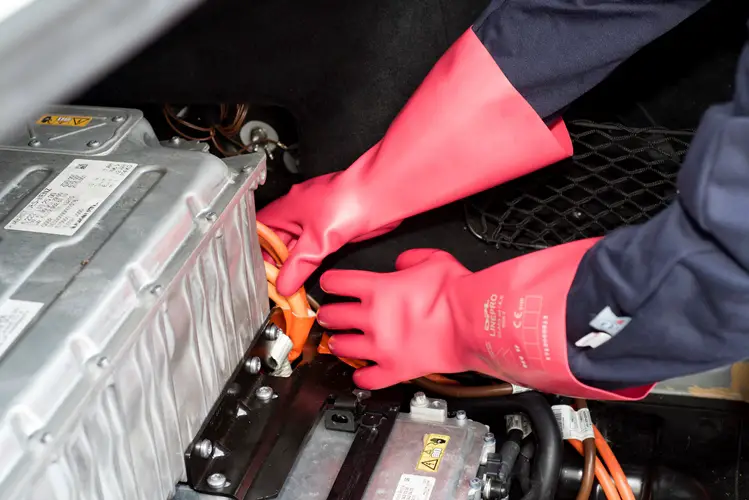Rubber gloves are the first line of defense that electricians wear to work. Since rubber gloves are insulators, they offer protection from electric current. When you’re wearing an OSHA-certified and ASTM-approved rubber glove, you’re guarded against electric hazards.
Although it’s a known fact that rubber gloves are insulators, not conductors, what most people do not know is what makes rubber gloves insulators, not conductors.
As someone who’s aware of the dangers of working with electricity, you might want to know more about rubber gloves. This post caters to all questions that you might be having. Dive in and explore the details about rubber gloves being insulators, not conductors.

Features of Rubber Gloves
Free electrons are needed for electricity to pass through a surface. 100% rubber does not have free electrons. And that’s why rubber gloves do not conduct electricity.
The kind of rubber gloves one wears at home for doing the dishes and cleaning cannot – and will never – offer protection at the workplace from electric current.
As an electrician, you require high-standard rubber gloves since not having them on will certainly put you at the risk of getting electrocuted.
Many workers in the past have sustained fatal injuries and as reports say, they did have rubber gloves on. What they might have done wrong was either they did not buy the OSHA verified gloves or they used rubber gloves from a year-old batch.
Rubber gloves will offer 100% insulation only when the type is right and they’re untampered and from a new batch.
What makes things further interesting is that all rubber gloves do not offer the same amount of insulation. So, glove classification is also very important when working with and around electricity.
Are Rubber Gloves Good for Electrical Work?
Yes, very much! Out of so many other materials that are insulators too, it’s the rubber that offers the best protection from electricity.
Electricity requires a medium with free electrons in order to pass through a surface into the ground.
Since the human body is that perfect medium as it contains free electrons, the minute you get in direct contact with an electric source, you get an electric shock.
That’s why rubber gloves are a very important part of PPE for electricians. The minute you put on your OSHA-certified gloves, the circuit to conduct electricity will break because rubber does not have free electrons.
There’s caution though: choose the class of gloves very carefully since different classes protect from different amounts of currents.
What are ASTM Guidelines for Rubber Gloves?
OSHA and ASTM are the two organizations that regulate and test all PPE products for workplace safety in the US, and rubber gloves are no different. Only those rubber gloves that have the words ASTM D120/IEC903 imprinted have passed the safety tests.
The air testing method is taken very seriously when testing the quality of gloves. The glove being tested is filled with air and checked for leakage of any sort. Only when it passes this test that it’s even considered for further testing.
The very important guidelines by ASTM for rubber gloves include the following:
1.) An unused rubber glove that comes from a year-old batch is not safe. It has to be tested again to determine if it’s still offering the right amount of protection.
2.) If there’s any cut, scratch, or hole in the glove, it compromises the safety. Hence, it should not be worn.
3.) The rubber glove you buy should belong to a specific class (to be discussed later on in this guide) depending upon the risk factor that’s involved.
The role of OSHA is to make sure that all the gloves coming in for testing meet the guidelines laid by ASTM. Only when a rubber glove gets the OSHA certification that it is considered to be a safe PPE product for electricians.
What are the Different Classes of Rubber Gloves?
You might be surprised to know that rubber gloves have different classes. Each class offers protection from different amounts of voltage. You should buy a rubber glove depending upon the amount of voltage you work with.
Here’s the list of classifications:
1.) Class 00 – Maximum use voltage of 500 volts AC/proof tested to 2500 volts AC.
2.) Class 0 – Maximum use voltage of 1,000 volts AC/proof tested to 5,000 volts AC.
3.) Class 1 – Maximum use voltage of 7,500 volts AC/proof tested to 10,000 volts AC.
4.) Class 2 – Maximum use voltage of 17,000 volts AC/proof tested to 20,000 volts AC.
5.) Class 3 – Maximum use voltage of 26,500 volts AC/proof tested to 30,000 volts AC.
6.) Class 4 – Maximum use voltage of 36,000 volts AC/proof tested to 40,000 volts AC.
Naturally, if you wear gloves that offer less protection from the voltage you’re with, you’re going to be at the risk of getting shocked. It’s usually class 0 to class 4 gloves that are used by electricians depending upon the kind of work they do.
4 Reasons that You Can Get Shocked Even When You’re Wearing Rubber Gloves
Some people say that you can get an electric shock even if you are wearing rubber gloves. You might want to hear us say that this isn’t true. Sadly, that’s not the case.
There have been incidents in the past where people have been shocked even while they were wearing rubber gloves.
It might make you wonder why an insulator would allow electricity to pass, right? Well, we have the answers. Have a look:
1.) You’re Wearing the Wrong Class of Rubber Gloves – The very reason that rubber gloves are divided into different classes shows that all the types do not offer the same level of protection.
If you’re working with 17,000 volts and wearing a class 1 rubber glove, you will naturally get shocked.
2.) You’re Not Wearing ASTM and OSHA Compliant Gloves – When the gloves you’re wearing do not have the certification by ASTM and OSHA, it means, they failed the safety parameters or the manufacturer did not send them for testing.
Washing dishes with such gloves is ok, wearing them while working with live wire isn’t.
3.) You’re Wearing a Defective Rubber Glove – You might be wearing a class 4 rubber glove but will still get shocked if the glove is defective. The obvious signs of defect include cuts and holes.
The less known defect is the swelling of the glove. If you see that the rubber is swollen, it’s a clear indication that the glove is chemically contaminated. Look for these signs and if you find them, don’t wear such gloves.
4.) You’re Wearing the Wrong Size Rubber Glove – Always pay attention to how well the cuffs fit you. They should sit right where they are and not bunch down on your wrist.
Bear in mind, if the cuffs are loose, so is the glove. Wearing a loose glove while working with electricity is nothing but suicide. The gloves might come off while you’re working.
3 Things to Keep in Mind When You’re Wearing Rubber Gloves
1.) Comfort is the Key – When you wear rubber gloves, make sure you slip high-quality leather protectors inside the gloves. They will offer a good amount of protection from cuts.
2.) Do Not Forget to Check the Grip – What’s the point of wearing gloves that interfere with your working capacity. So, always check if the rubber glove you’re wearing offers a good grip on the objects you’re holding.
3.) 100% Rubber is the Only Solution – Even if it says 98% rubber, don’t buy those gloves since they will not protect you from getting shocked.
Even one perfect of adulteration means there could be free electrons. You might not die, but the chances that you’ll sustain serious burn injuries are very high.
Best Rubber Gloves
1.) Electrical Insulating Lineman Safety Gloves by Magid
- ARC flash 0 insulating latex glove for lineman work, electrical contractor and field service work, high-voltage machine operations, and other industrial applications
- Black dielectric natural rubber latex is non-conductive and provides better elasticity than nitrile, chloroprene, or vinyl, and better puncture resistance than vinyl
- Glove is 11 long and has a straight cuff with a rolled edge
Prices pulled from the Amazon Product Advertising API on:
Product prices and availability are accurate as of the date/time indicated and are subject to change. Any price and availability information displayed on [relevant Amazon Site(s), as applicable] at the time of purchase will apply to the purchase of this product.
These are 100% rubber gloves that are in full compliance with ASTM D120-09 and OSHA 29C FR 1910.269. More than that, they also have the additional NFPA compliance certificate. So, they’re certified by all bodies working to ensure workplace safety from electrical hazards.
Some other benefits that have earned these gloves the top spot in our list of 2 best insulation gloves are as follows:
1.) They’re ambidextrous. They will fit you irrespective of whether you’re left-handed or right-handed.
2.) These are class 0 rubber gloves that offer up to 1,000V AC/1,500V DC voltage protection.
3.) They do not reduce the working capacity because they offer a very good grip.
Check Price and Reviews on Amazon2.) Ansell Gloves Rubber Insulating Gloves

These 100% rubber gloves are excellent options for low-voltage threats. They are in compliance with all the standards laid by ASTM and are tested by OSHA. Some of the benefits that these gloves offer are as follows.
1.) They offer a perfect grip. You will be able to hold onto the products you’re using for work very easily.
2.) When you wear the right size with leather protectors, you’ll feel comfortable even if you have to wear these gloves continuously for hours.
3.) It’s very easy to keep the gloves clean and they dry in natural air very quickly.
Concluding Thoughts:
Rubber gloves are very good insulators. Hence, they’re very much preferred by electricians and linemen. Since there are different classes of gloves, you should buy the type depending upon the level of protection you require.
It’s very important to note that only when the gloves are 100% rubber and approved by ASTM and OSHA that they will offer protection from getting electrocuted.
When you buy insulation rubber gloves, always look for the aforesaid certifications. That’s the only guarantee that your rubber gloves will not conduct electricity.








